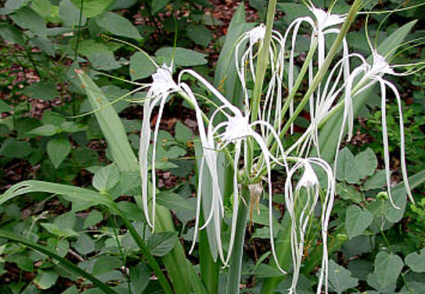Abstract
Hymenocallis ruenesiana is described and illustrated as a new species from the Yucatan Peninsula, Mexico. When comparing the morphological characters of the leaf, inflorescence, fruit and pollen, as well as the environmental conditions of the habitat of H. ruenesiana, discontinuities were found with those of Hymenocallis littoralis. Hymenocallis ruenesiana is endemic to the Yucatan peninsula, inhabiting seasonal savannas with clayey and floodable soils, while H. littoralis naturally inhabits the coasts, on easily drained sandy soils and it is also widely cultivated as an ornamental plant.
References
- Alfaro Bates, R.G., Acereto, J.A., Ortiz-Díaz, J.J., Viera-Castro, F.A., Burgos-Pérez, A.I., Martínez-Hernández, E. & Ramírez-Arriaga, E. (2010) Caracterización palinológica de las mieles de la península de Yucatán. CONABIO-UADY, Mérida, Yucatán, México, 156 pp.
- Bachman, S., Moat, J., Hill, A.W., de la Torre, J. & Scott, B. (2011) Supporting Red List threat assessments with GeoCAT: geospatial conservation assessment tool. ZooKeys: 117–126. https://doi.org/10.3897/zookeys.150.2109
- Erdtman, G. (1952) Pollen morphology and plant taxonomy, Vol. 1. Angiosperms. Almquist and Wiksell, Stockholm, 568 pp.
- International Union for Conservation of Nature (IUCN) (2012) The IUCN Red List categories and criteria. Ver. 3.1. 2nd ed. IUCN.
- IUCN Standards and Petitions Committee (2024) Guidelines for Using the IUCN Red List Categories and Criteria. Version 16. Prepared by the Standards and Petitions Committee. [https://www.iucnredlist.org/documents/RedListGuidelines.pdf]
- Jacquin, N.J. (1763) Selectarum Stirpium Americanarum Historia. Ex Officina Krausiana, Vindobona [Vienna], 329 pp.
- Linnaeus, C. von. (1753) Species Plantarum, Editio Secunda 1. Imprensis Direct. Laurentii Salvii, Holmiae, 784 pp.
- Martín, J., Raymúndez, M.B., Vallès, J., Garnatje, T. & Raimúndez, E. (2012) Palynological study of the Venezuelan species of the genus Hymenocallis (Amaryllidaceae). Plant Systematics and Evolution 298: 695–701. https://doi.org/10.1007/s00606-011-0579-z
- Meerow, A.W. & Dehgan, B. (1985) The auriculate pollen grain of Hymenocallis quitoensis Herb. (Amaryllidaceae) and its systematic implications. American Journal of Botany 72: 540–547.https://doi.org/10.1002/j.1537-2197.1985.tb08307.x
- Meerow, A.W., Guy, C.L., Li, Q.-B. & Yang, S.-L. (2000) Phylogeny of the American Amaryllidaceae based on nrDNA ITS sequences. Systematic Botany 25 (4): 708–726. https://doi.org/10.2307/2666729
- Meerow, A.W., Guy, C.L., Li, Q.-B. & Clayton, J.R. (2002) Phylogeny of the tribe Hymenocallideae (Amaryllidaceae) based on morphology and molecular characters. Annals of the Missouri Botanical Garden 89 (3): 400–413.https://doi.org/10.2307/3298600
- Meerow, A.W., Gardner, E.M. & Nakamura, K. (2020) Phylogenomics of the Andean tetraploid clade of the American Amaryllidaceae (subfamily Amaryllidoideae): unlocking a polyploid generic radiation abetted by continental geodynamics. Frontiers in Plant Science 11: 582422.https://doi.org/10.3389/fpls.2020.582422
- Morrone, J.J. (2014) Biogeographical regionalisation of the Neotropical region. Zootaxa 3782 (1): 1–110.https://doi.org/10.11646/zootaxa.3782.1.1
- Raymúndez, M.B., Escala, M. & Xena de Enrech, N. (2005) Morfoanatomía foliar como herramienta para la delimitación de especies del género Hymenocallis Salisb. (Amaryllidaceae) presentes en Venezuela. Acta Botánica Venezuelica 28: 301–320.
- Saint-Hilaire, J.H.J. (1805) Exposition des Familles Naturelles I. Treuttel et Würtz. Paris, France, 749 pp.
- Salisbury, R.A. (1812) Transactions of the Horticultural Society of London. Horticultural Society of London, London, 449 pp.
- Sawyer, R. (1988) Honey identification. Cardiff Academic, Canterbury, United Kingdom, 115 pp.
- Schneider, C.A., Rasband, W.S. & Eliceiri, K.W. (2012) NIH Image to ImageJ: 25 years of image analysis. Nature methods 9: 671–675.https://doi.org/10.1038/nmeth.2089
- Sealy, J.R. (1954) Review of the genus Hymenocallis. Kew Bulletin 9: 201–240. https://doi.org/10.2307/4114384
- Smith, G.L. & Flory, W.S. (2003) Hymenocallis. Flora of North America @ efloras.org. Available from: http://www.efloras.org/florataxon.aspx?flora_id=1&taxon_id=116083 (accessed 17 June 2023)
- Shorthouse, D.P. (2010) SimpleMappr, an online tool to produce publication-quality point maps. Available from: https://www.simplemappr.net (accessed 22 May 2023)
- Sweet, R. (1830) Sweet’s Hortus Britannicus, or: A catalogue of all the plants indigenous or cultivated in the gardens of Great Britain. Second edition, James Ridgway, 169, Piccadilly, London, 639 pp.
- Thiers, B. (2023) Index Herbariorum: A Global Directory of Public Herbaria and Associated Staff. New York Botanical Garden’s Virtual Herbarium. Available from: https://sweetgum.nybg.org/science/ih/ (accessed 28 February 2023)
- Villaseñor, J.L. (2016) Checklist of the native vascular plants of Mexico. Revista mexicana de biodiversidad 87: 559–902.https://doi.org/10.1016/j.rmb.2016.06.017
- Walker, J.W. & Doyle, J.A. (1975) The bases of angiosperm phylogeny: palynology. Annals of the Missouri Botanical Garden: 664–723.https://doi.org/10.2307/2395271


